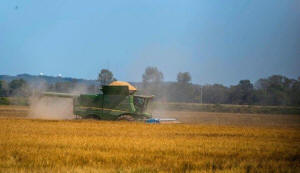Ag economist pushes for more free trade, not less
 Send a link to a friend
Send a link to a friend
 [February 25, 2023]
By Zeta Cross | The Center Square contributor [February 25, 2023]
By Zeta Cross | The Center Square contributor
(The Center Square) – Breaking down non-tariff trade barriers is a major
concern for American farmers.
Last year was a banner year for U.S. agricultural exports. International
sales of U.S. farm products rose by 11% in 2022, exceeding $196 billion.
The outlook for 2023 looks like that growth will continue.
Illinois farmers depend on robust sales overseas to remain profitable.
“Exports are absolutely crucial to the agricultural sector, particularly
in the Midwest,” University of Illinois agriculture economist Gary
Schnitkey told The Center Square.
Soybean farmers, for example, export 50% of their crop.
“Those exports increased in 2022, in part because there was a drought
and shortages, to a certain extent, in Brazil and Argentina,” two of the
U.S.’s top export competitors, Schnitkey said.
U.S. farmers have come off three very profitable years, where good
weather, high yields and high demand have meant high prices. For that to
continue, the export market needs to remain vibrant.

“For income and prices to remain at the levels they are now, we need
exports to continue to grow,” Schnitkey said.
Illinois is the number one state in the U.S. for soybean production.
Brazil is a top U.S. competitor in soybean exports. China is the number
one buyer of exported soybeans for both the U.S. and Brazil.
USDA undersecretary for trade and foreign agricultural affairs Alexis
Taylor was in Iowa this month to talk about the Biden administration’s
efforts to increase international trade. She told Brownfield Ag News
that the USDA is working to expand market opportunities.
[to top of second column]
|

A farmer harvests soybeans in a Missouri
field.
Maria Moore/Missouri Department of Agriculture

“Strong export markets are really critical to farmers' and ranchers'
livelihoods,” she told Brownfield.
“An overreliance on any single market could lead to trade disruptions,”
she said.
One of the failings of U.S. trade policy in the past few years,
Schnitkey said, is the failure to remove non-tariff trade barriers with
other countries, in particular with the Pacific Rim countries.
“The idea of freer trade in agriculture has not been growing. We seem to
be taking steps back. And that is not a good thing for the wellbeing of
U.S. farmers,” Schnitkey said.
Schnitkey would like to see the removal of non-tariff trade barriers get
higher priority from the government
here is not a big push to make that happen,” Schnitkey said. “It is not
a priority these days.”
Nigeria and the Pacific Rim countries are markets with potential for
more U.S. trade, Schnitkey said.
“Free trade and freer trade is a message that most commodity groups feel
is important,” he said.
 |